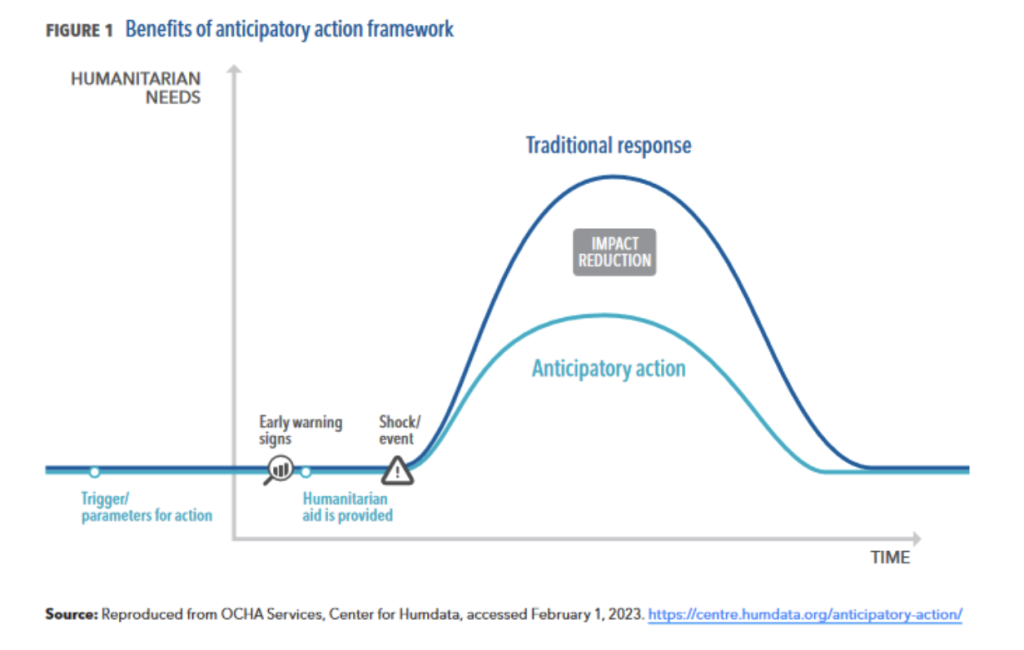Highlights:
The 2023 Global Food Policy Report explores a growing body of evidence on how diverse policy responses can reduce both the immediate and longer-term impacts of food crises, and improve livelihoods, incomes, and food security and nutrition for the future. Drawing on research from IFPRI and other CGIAR centers, it provides evidence-based policy recommendations for governments, donors, and nongovernmental organizations.
CHAPTER 1 deals with rethinking Responses to Food Crises, calling in particular for investments in better preparing for crisis i.e. early warning and anticipatory actions, but also in creating resilient food systems and supporting the most vulnerable via social protection systems and crisis response funding on the other hand.
CHAPTER 2 deals with risk monitoring and early warning for early action and makes recommendations for increasing the effectiveness of early warning systems, in particular improving the monitoring of risk factors and structural causes of crises and strengthening the analysis of factors driving crises.
CHAPTER 3 deals with Humanitarian Response and Anticipatory Action in order to build crisis resilience. It makes a series of recommendations to improve the impact of humanitarian response and anticipatory action, in particular by developing anticipatory actions frameworks that pre-identify vulnerabilities and supporting interventions that reflect the humanitarian-development-peace nexus.

CHAPTER 4 deals with building resilient food systems. According to the authors, to ensure agri-food value chains contribute to recovery and resilience, it is particularly critical to tailor crisis response to the type of shock and the particular context and type of the value chain.
CHAPTER 5 deals with adaptive safety nets for crisis recovery and stresses how critical social protection can be in times of crisis. The authors regret that globally, ad hoc responses remain the norm, with the share of official development assistance (ODA) allocated to humanitarian aid increased rapidly over the past decade, while the share of ODA allocated for social protection remained relatively stagnant (Figure 3).
One key recommendation to boost the role of safety nets in recovery and resilience is to explore new ways to cover the costs of social protection, such as climate or green financing schemes, and to reduce costs of implementation, such as use of cash transfers and mobile payments when appropriate for the context.

CHAPTER 6 deals with promoting gender equality in fragile and conflict-affected Settings. One recommendation highlighted by the authors is to adopt innovative methods to address the gender data gap, like for example providing mobile phone access to women to enable them to receive cash transfers directly while providing a platform for high-frequency data collection and targeted information campaigns.
CHAPTER 7 deals with forced migration and how to improve the outcomes of this difficult decision.
The second part of the report is dedicated to regional developments and focuses on Africa, Middle East and North Africa, Central Asia, South Asia, East and Southern Asia and Latin America and the Caribbean.
| Year of publication | |
| Geographic coverage | Latin America and the CaribbeanNorthern AfricaSouth-Eastern AsiaSouthern AsiaCentral AsiaAfricaGlobalMiddle East |
| Originally published | 17 Apr 2023 |
| Related organisation(s) | IFPRI - International Food Policy Research Institute |
| Knowledge service | Metadata | Global Food and Nutrition Security | Food systems transformationEarly warning systemFood and nutrition securityGender mainstreamingSafety net |
| Digital Europa Thesaurus (DET) | COVID-19aid policyrisk managementdisaster risk reductionemergency responsewar in Ukrainehumanitarian aidaid systemsocial protectionpolicymaking |
